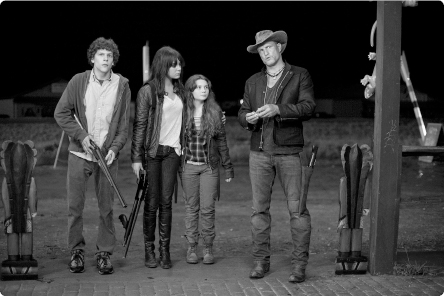Maintaining Friendships

As Columbus, Wichita, Little Rock, and Tallahassee grow to trust, defend, and depend on one another in Zombieland, they realize that friendship is one of the key elements to surviving a zombie attack, and to being (and staying) human.
Glen Wilson/© Columbia Pictures/Courtesy Everett Collection
In the movie Zombieland, four people known by the monikers of their former hometowns struggle to survive in a postapocalyptic world (Fleischer, Reesee, & Werrick, 2009). The central character, Columbus, is a self-described loner who never had close ties to friends or family. As he puts it, “I avoided people like they were zombies, even before they were zombies!” To deal with the challenge of constant flesh-eater attacks, he develops a set of rules, including Rule #1: Cardio (stay in shape to stay ahead of zombies); Rule #17: Don’t be a hero (don’t put yourself at risk to save others); and Rule #31: Always check the backseat (to avoid surprises). Eventually, he bands together with three other survivors—Tallahassee, Wichita, and Little Rock—and learns that they too have trust issues, regrets regarding their former lives, and fears about the future (above and beyond zombie attacks). As they travel across the country together, they learn to trust, support, defend, and depend upon each other. This leads to a friendship that eventually deepens to a family-like bond. Columbus even chooses to bend Rule #17 to save Wichita, by being a hero. As he narrates in the final scene, “Those smart girls in the big black truck and that big guy in that snakeskin jacket—they were the closest to something I’d always wanted, but never really had—a family. I trusted them, and they trusted me. Even though life would never be simple or innocent again, we had hope—we had each other. And without other people, well, you might as well be a zombie!”
Friendships don’t endure on their own . . . they flourish only when you consistently communicate in ways that maintain them.
It’s true. We need our friends. Most of us don’t need them for survival, as we don’t face daily zombie attacks. But our friends do provide a constant and important shield against the stresses, hardships, and threats of our everyday lives. We count on friends to be there when we need them and to provide support; in return we do the same. This is what bonds us together.
At the same time, friendships don’t endure on their own. As with romantic and family involvements, friendships flourish only when you consistently communicate in ways that maintain them. Two ways that we keep friendships alive are by following friendship rules and by using maintenance strategies.